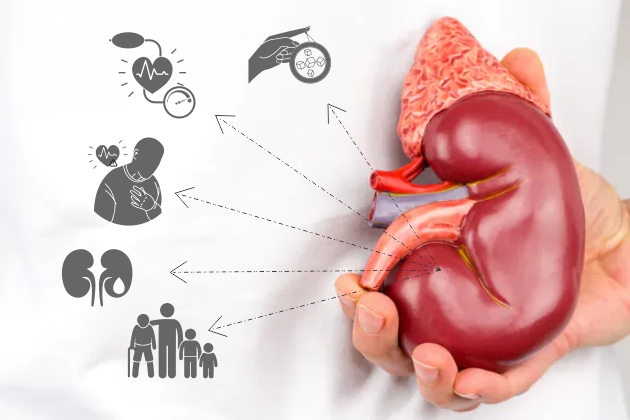
 Chronic kidney disease (CKD) is a condition that involves a gradual loss of kidney function. It leads to a buildup of fluids, wastes, or electrolytes in our body because kidneys cannot filter these wastes from the blood to urine. Some of the chronic kidney disease symptoms are nausea, vomiting, loss of appetite, and decreased mental sharpness. If CKD is not detected at an early stage, kidney function becomes very slow leading to severe kidney damage and kidney failure. In this case, kidneys can only be treated with dialysis or a kidney transplant. This happens mostly in older adults when their risk factors such as high blood pressure, blood sugar, and cholesterol levels are not managed.
Chronic kidney disease (CKD) is a condition that involves a gradual loss of kidney function. It leads to a buildup of fluids, wastes, or electrolytes in our body because kidneys cannot filter these wastes from the blood to urine. Some of the chronic kidney disease symptoms are nausea, vomiting, loss of appetite, and decreased mental sharpness. If CKD is not detected at an early stage, kidney function becomes very slow leading to severe kidney damage and kidney failure. In this case, kidneys can only be treated with dialysis or a kidney transplant. This happens mostly in older adults when their risk factors such as high blood pressure, blood sugar, and cholesterol levels are not managed.
Signs and Symptoms of Kidney Disease
Chronic kidney disease symptoms develop over time as kidney damage progresses gradually. Some of the common symptoms of chronic kidney disease include:
- Tiredness
- Weakness
- Chest pain
- Swollen ankles and feet
- Dry and itchy skin
- Shortness of breath
- Feeling sick
- Blood in urine
- Headaches
- Trouble in sleep, depression
- Weight loss
- Low concentration
- Muscle cramps
- Puffiness around the eyes in the morning
- Increased urination
Health problems associated with Cronic Kidney Disease
- Anemia
- Weak bones
- High blood pressure
- Poor nutritional health
- Nerve damage
- The weak immune system which results in infections
- Poor memory
- Low calcium levels, high potassium, and high phosphorus levels in the blood can cause an abnormal heartbeat and lead to death
- Heart disease and stroke
Causes of Chronic Kidney Disease:
- Diabetes
- High blood pressure
- High Cholesterol
- Kidney infections
- Polycystic kidney disease
- Kidney stones or enlarged prostate
- Family history of kidney failure
How to Manage Chronic Kidney Disease?
- Manage blood sugar and blood pressure by checking regularly
- Stop smoking and alcohol intake
- Avoid exposure to certain medicine, antibiotics, or herbal supplements that may harm the kidneys or cause kidney function to suddenly get worse
- Consult a dietitian for a healthy eating plan that has low in salt and fat and has the right amount of protein.
Chronic kidney disease symptoms can be managed and prevented by early diagnosis with the help of a serum electrolytes test. This test is done to measure the levels of Sodium (Na), Chloride (Cl), and Potassium (K) present in the blood. A balanced level of Na and Cl helps in controlling fluid in the body and also helps in maintaining blood pressure. A balanced level of Potassium helps muscles to work properly.